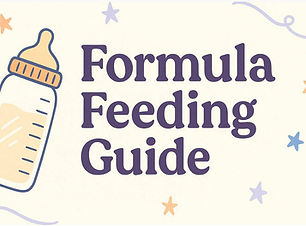Feeding
Feeding babies encompasses various stages and methods tailored to their growing needs. Breastfeeding, often recommended for its nutritional and emotional benefits, provides infants with essential antibodies and nutrients crucial for their development. Alternatively, formula feeding ensures babies receive necessary nutrients even when breastfeeding isn't possible. As babies approach six months, introducing solids becomes pivotal, marking a gradual transition to a diverse diet. This phase allows your little one to explore different tastes and textures, fostering their motor skills and independence. While a crucial and part of their day to day life, feeding your baby is not always straightforward. Use these resources to help support your feeding journey, no matter what that looks like.

Created by Dr. Jennifer Prince, The Formula Feeding Guide is a 100+ page no-pressure road map to understanding formula types, decoding ingredients, and making confident choices to ease your baby's feeding challenges.

Created by Dr. Jennifer Prince, The Complete Elimination Diet Guide gives parents step-by-step guidance to safely identify food triggers, manage allergies and intolerances, and maintain proper nutrition so that you can feed your baby with confidence and peace of mind.

Created by Dr. Jennifer Prince, this bundle gives you the expert guidance and clarity you need to confidently nourish your baby. It includes The Formula Feeding Guide, The Elimination Diet Guide, and a Personalized Formula Recommendation from Dr. Prince tailored to your baby’s specific needs.

How do you safely prepare a bottle of infant formula? Should you boil the water? Is it okay to prepare in advance? What if baby doesn't finish their bottle? And why are EU guidelines different to North America?

Could an allergy or intolerance be contributing or even causing your baby's symptoms?

Is your baby crying during or after a feeding? Hungry but difficult to feed? Reluctant to eat or refusing entirely?

Paced bottle feeding mimics the speed of nursing and is a way to avoid unintentional overfeeding

What is palm oil? Why is it found in some baby formulas? Should you worry about it?
How do formulas manufactured in the United Kingdom and European Union compare with one another?






